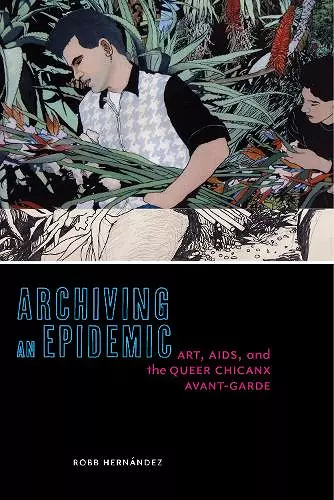Archiving an Epidemic
Art, AIDS, and the Queer Chicanx Avant-Garde
Format:Hardback
Publisher:New York University Press
Published:19th Nov '19
Currently unavailable, and unfortunately no date known when it will be back
This hardback is available in another edition too:
- Paperback£22.99(9781479820832)

Honorable Mention, 2021 Latinx Studies Section Outstanding Book Award, given by the Latin American Studies Association
Winner, 2020 Latino Book Awards in the LGBTQ+ Themed Section
Finalist, 2019 Lambda Literary Award in LGBTQ Studies
Critically reimagines Chicanx art, unmasking its queer afterlife
Emboldened by the boom in art, fashion, music, and retail culture in 1980s Los Angeles, the iconoclasts of queer Aztlán—as Robb Hernández terms the group of artists who emerged from East LA, Orange County, and other parts of Southern California during this period—developed a new vernacular with which to read the city in bloom. Tracing this important but understudied body of work, Archiving an Epidemic catalogs a queer retelling of the Chicana and Chicano art movement, from its origins in the 1960s, to the AIDS crisis and the destruction it wrought in the 1980s, and onto the remnants and legacies of these artists in the current moment. Hernández offers a vocabulary for this multi-modal avant-garde—one that contests the heteromasculinity and ocular surveillance visited upon it by the larger Chicanx community, as well as the formally straight conditions of traditional archive-building, museum institutions, and the art world writ large.
With a focus on works by Mundo Meza (1955–85), Teddy Sandoval (1949–1995), and Joey Terrill (1955– ), and with appearances by Laura Aguilar, David Hockney, Robert Mapplethorpe, and even Eddie Murphy, Archiving an Epidemic composes a complex picture of queer Chicanx avant-gardisms. With over sixty images—many of which are published here for the first time—Hernández's work excavates this archive to question not what Chicanx art is, but what it could have been.
A much-needed publication on queer Chicanx art and artists in Southern California during the 1970s and 1980s, as well as a study of loss, memory, and memorialization in the wake of the AIDS crisis...Hernandez's work to reassemble the "wreckage" of AIDS art and performance allows us to imagine archival methods beyond institutions in performative and creative ways that look to infinite and speculative recastings of history for those the archive left behind. (Latin American and Latinx Visual Culture) Hernández has created a methodology that is built from an understanding that archives are always flawed endeavors, especially given that so much art and performance created in response to AIDS has been lost or destroyed. Instead, he utilizes an approach that embraces degradation and incompletion. By meticulously attending to absences and failures in the work he studies, Hernández's book offers an innovative new methodology for archival practice ... Hernández's examination of queer Chicanx avantgarde practices is urgent and long overdue. (The Drama Review) Provides a detailed, sensitive, and textured account of the precarious histories of queer Chicanx artists during the first decades of the ongoing AIDS crisis. This remarkable book offers new ways of thinking about how to reconstruct such histories by attending to the emotional and spatial qualities of the archives, homes, detritus, mementos, and memories that Hernández explores with the reader. While Archiving an Epidemic is a groundbreaking historical recovery of queer art in Los Angeles in the 1980s and 1990s, it is also a reflection on loss, absence, silence, and the threat of erasure. Not only will this book be an essential text in the literatures on queer art, Chicanx art, and the AIDS pandemic, it should be read by anyone confronting archives and their limits. Indeed, no one studying American art and culture of the late twentieth century can afford not to read this book. - David J. Getsy, School of the Art Institute of Chicago Hernández queers the archive while also stepping outside its institutional limits and into the realm of the absences and shards of human loss from AIDS. In doing so, Hernández develops an alternative methodology for 'queer detrital analysis' that brings the body and space to bear. A tour de force in its archival and critical breadth, this book vividly reimagines the American avant-garde since the 1960s through queer Chicanx artists, groups, and spaces in Southern California. - Chon Noriega, University of California, Los Angeles
ISBN: 9781479845309
Dimensions: unknown
Weight: 594g
320 pages